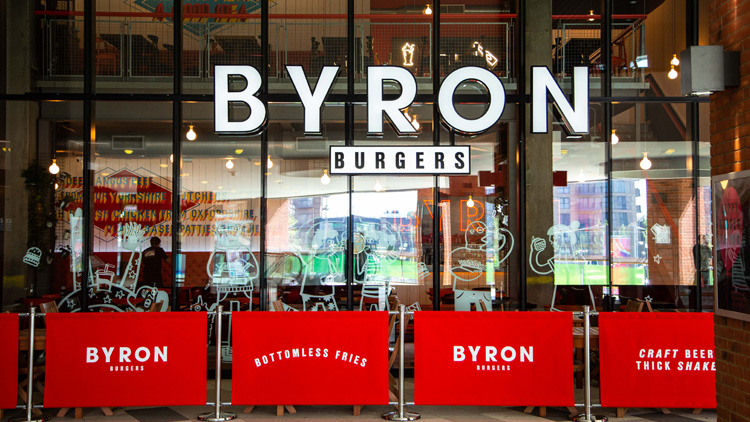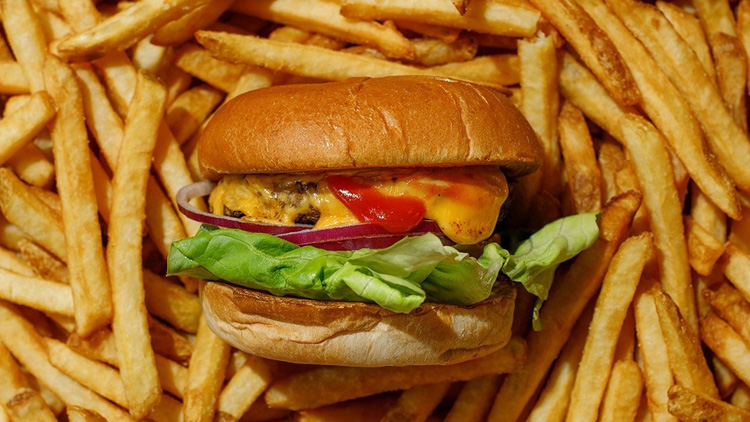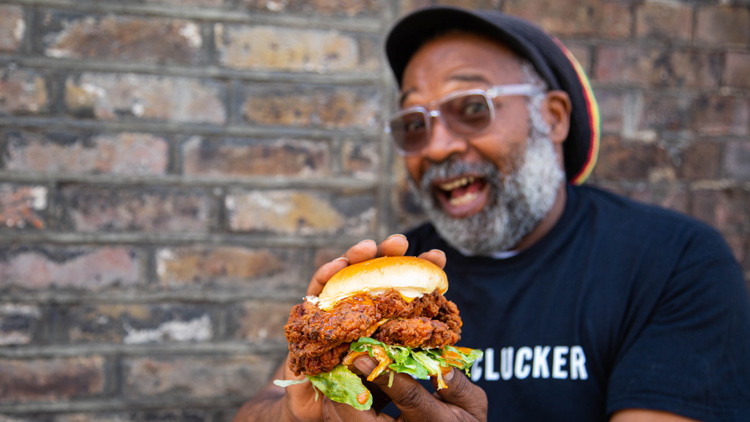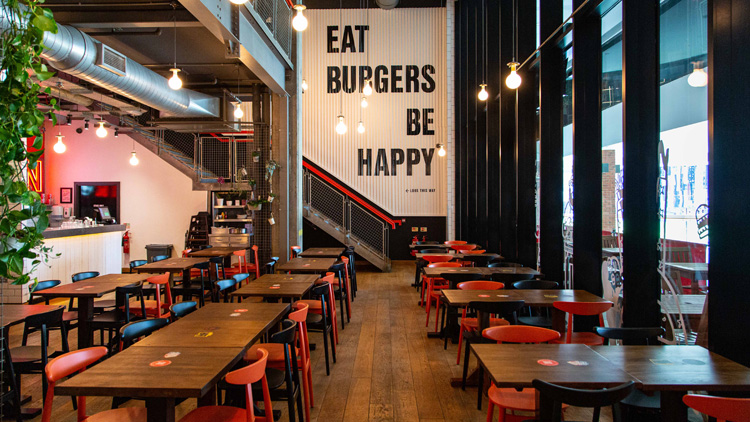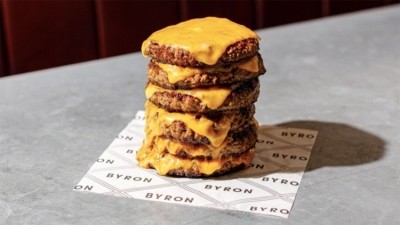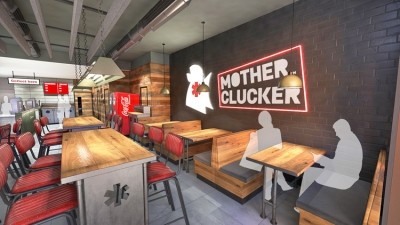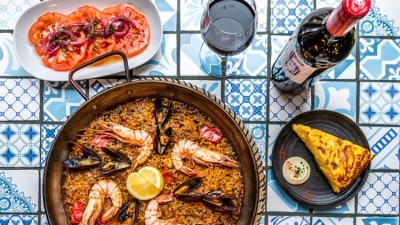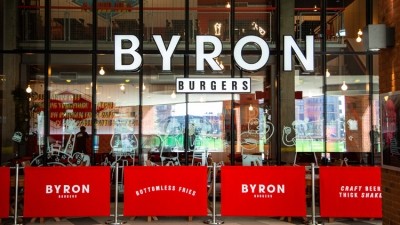Building back better - what next for Byron?
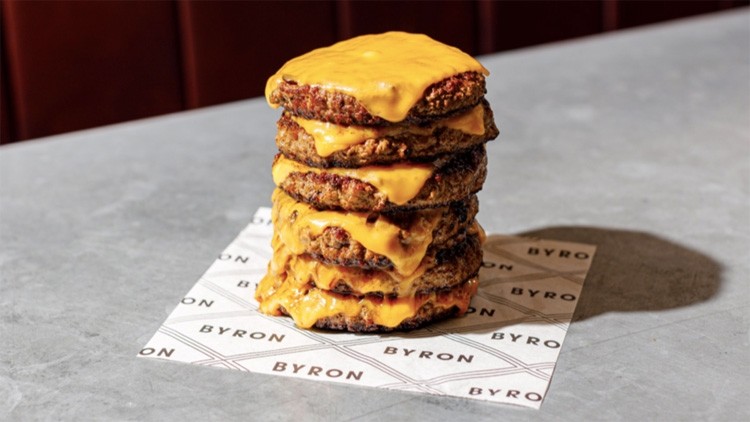
Simon Wilkinson pauses, briefly; thinking carefully about his next answer. The Byron CEO is reflecting on what has been a particularly strenuous year and a half, involving administration, a pre-pack deal, and the closure of more than half the group’s estate. The question: ‘Did he ever fear this was the end for the better burger brand?’
“I never thought we wouldn’t make it, but there’s always uncertainty,” he says. “We were asking people to put money into our pocket, at what was a really unpredictable time. When we reopened after the first lockdown, we didn’t think we’d then have to shut down all our restaurants again, twice. But I was always confident, and what we have now is a strong foundation for new growth.”
We meet in Byron’s flagship Covent Garden restaurant; one of 20 that survived as part of the pre-pack. It’s a weekday lunchtime and despite central London footfall remaining sluggish and many local offices still closed, trade is encouragingly steady.
Byron, the once darling of the better burger scene, fell into administration last summer. The group hired KPMG to explore options for accessing emergency funding mere days after the first lockdown hit in March last year; the shutdown having taken £25m out of the business’ cashflow. By May, the burger chain’s then-owner Three Hills Capital Partners had begun to sound out potential buyers; and a month later filed a notice of intention to appoint administrators.
Eventually, in August, the joint administrators sold the business to investment company Calveton UK Limited, with Three Hills Capital Partners taking a minority stake. In total, 31 of Byron’s 51 sites were closed because of the takeover, with 651 staff made redundant. Since the deal, Byron has been housed under parent company Famously Proper, a nod to the brand’s recognisable ‘proper burgers’ strapline.
“We want Byron to be the most digitally accessible premium burger brand in the UK"
Wilkinson makes no attempt to sugar-coat the struggles faced by Byron over the past 16 months. However, he’s also keen to move the conversation forward.
Since reopening its estate for indoor dining in mid-May, sales at Byron have been up on 2019. “That’s massive for us,” says Wilkinson. “We’re really encouraged by the response we’ve had from customers since reopening. Sales across both the restaurants and delivery are strong, and we’re very happy with our financial position.”
What’s more, Byron has recently opened a brand-new restaurant in Wembley’s London Designer Outlet; its first new bricks and mortar location in five years. And the hunt is on for additional sites. “We want Byron to be the most digitally accessible premium burger brand in the UK, that’s what our internal aspiration is now,” he adds.
A monumental task
Wilkinson joined Byron in the summer of 2019 following what had already been a turbulent time for the burger group. The once edgy, cool brand, which was one of the first to move away from the cookie cutter approach to restaurant openings and embrace the industrial chic look of exposed plaster, brickwork and ventilation that has since become commonplace, had already lost some of its early shine.
When then Chancellor George Osborne was famously ridiculed for opting for a Byron burger the evening before announcing his budget in 2013 the group’s street cred slipped further still. Then, in 2016 the company found itself once again grabbing the headlines when it was accused of setting an immigration trap for migrant workers following a raid on the company that rounded up 35 workers.
In early 2018 the business permanently closed almost a third of its then 70-strong estate as part of a Company Voluntary Agreement (CVA) that saw Three Hills Capital Partners replace previous owner Hutton Collins as majority shareholder.
The closures followed a financially volatile period that saw Byron expand rapidly within an ever more saturated marketplace. Hutton Collins acquired the group in 2013 for £100m. At the time it had 34 sites; by the beginning of 2018 that number had more than doubled, with the bulk of its restaurants located in the capital.
“When Hutton Collins owned [Byron], the focus was on numbers and growth,” reflects Wilkinson, candidly. “And in their quest to hit those numbers, they probably chose locations that weren’t right, on rent deals that weren’t sustainable. They took their eye off the ball. They became complacent, and probably got a bit of greedy; and the business became tired and old.”
Even without the added burden of a global pandemic, trying to recover from a period of such crippling instability is no straightforward proposition. It’s a monumental task; perhaps an impossible one. No other business springs to mind that has suffered such a remarkable fall from grace and successfully managed to get back on top.
If anyone is up to the task, though, it’s Wilkinson, who has form in reversing the fortunes of embattled casual dining brands. In 2011 he took over the running of struggling Spanish tapas chain La Tasca overseeing a remarkable turnaround of the business that led to its acquisition by Casual Dining Group for £20-£25m in 2015.
With regards to Byron, Wilkinson is clear about the direction he wants to take the group but remains guarded when probed about his expansion strategy. “As a company, Famously Proper wants to grow Byron,” he says. “We’re not going to replicate what was done in the past because it didn’t work, but where we think there’s an opportunity, we’ll take it.
“Take London, for example. Byron clearly had too many sites in the capital before. Now we have five restaurants, plus a handful of delivery kitchens, and we’re comfortable with that coverage. Instead, there’s a couple of regional cities we’re looking at. Places we’ve been before, but where we didn’t have the right site on the right terms.”
Bringing Byron back to its roots
At the time Wilkinson came on board, Byron was already undergoing a ‘complete overhaul’ of its design, service, supply chain and menu, in response to the CVA. It included a redesigned interior with more soft seating and communal tables; a new logo, which was meant to represent ‘five guests at the table’; and a brunch menu overseen by chef and food writer Sophie Michell.
Wilkinson allowed Byron’s original London restaurant in High Street Kensington to be a testbed ahead of a proposed wider revamp of the business, which launched in October 2019. However, it soon became apparent to him that the approach wasn’t quite right.
“Having got under the skin of the business, I didn’t think it was being taken in the right direction. The offer had been overcomplicated, and it felt like they were trying to reposition the brand as a more approachable version of Soho House. There is probably a gap in the market for something like that, but it’s not something I was interested in pursuing. It wasn’t Byron.”
Instead, Wilkinson and his team got to work on a new strategy to bring Byron back to its roots; something that has been supported by Calveton UK Limited since it acquired the business. “Byron is famous for having a brilliant burger, craft beer, and the best milkshake on the market. That’s what we want to be recognised for, and we’re doing that by focusing our energy on the brand’s core values: quality of product, innovation, and accessibility.”
To that end, Wilkinson has spent much of lockdown redesigning the menu, which he says had become too big. “That’s a sign a business is struggling,” he adds. “They add new dishes in the hope it’ll widen the customer base and drive more spend, but it’s not the case. The key for us is to focus on what we do and do it really well.”
“If we’re going to be the number one burger brand, we need to have the best burger”
As such the menu is now about half the size it was before. It features a concise range of burgers, with beef, chicken and plant-based options available, alongside a short selection of sides. All burgers are now served with either bottomless fries – a new addition – or a house salad; and across the board prices have been reduced.
The burger itself has changed too. Wilkinson has switched to a premium, pure Aberdeen Angus blend of flank, chuck, brisket and short rib that’s sourced from a butcher in Yorkshire. The patty size has also increased, from five ounces to six.
“If we’re going to be the number one burger brand, we need to have the best burger,” says Wilkinson, as a waiter approaches with a tray laden with burgers and fries. They include a special limited-edition burger launched to coincide with the UEFA Euro 2020 championships called The Dribble, which features two patties served in a football-shaped artisan bun with double American cheese, double cheddar, salted grilled onions, and ‘Byron sauce’. While the name is rather grotesque, the burger itself – despite being as messy as its moniker suggests – is a winner; rich, juicy, and enjoyably indulgent… just make sure you ask for extra napkins.
Elsewhere, Byron has also begun investing more in new technology as it moves to a digitally-led format. Order and pay is being installed across all sites within the next month, following the recent switch from physical menus to QR codes. Click and collect has also been introduced, and a new website has recently launched.
“I’m a great believer that in whatever life throws at you, there’s always positives to come out,” says Wilkinson. “We’re doing a lot to improve the guest journey, and technology is key to that. It was an area I wanted to explore anyway, but had it not been for the pandemic it would certainly have taken longer to get to where we are now.”
Mother Clucker
As well as Byron, Famously Proper is also focused on growing its portfolio. In May, it acquired fried chicken operator Mother Clucker, which was founded by Ross Curnow and Brittney Bean in 2013 and has restaurants in Clerkenwell and Stanstead Airport alongside numerous street food pitches in London and a number of Deliveroo Editions sites.
“We wanted a brand that was a market leader in its field,” says Wilkinson, discussing the acquisition. “We’d already toyed with inventing our own fried chicken brand, called Byron Byrd, but then we were presented with the opportunity to buy an established business instead; one with a robust following.”
Curnow and Bean have left the business as part of the deal, but the brand’s ‘unique method and technique’ for preparing the chicken, which involves brining the meat in tea and double dipping it in batter before frying, remains intact. “Mother Clucker is a premium, good quality chicken concept, and it sits nicely in our portfolio. We could do a pop up with it in one of our Byron without complicating the offer, but we also think it’s scalable.”
Having only recently integrated the business within the wider parent company, Wilkinson is tight-lipped about expansion plans for now. “We’re still working on the strategy, but the same principles we use for Byron will apply. Namely, offering a premium product at an affordable price.
“At the moment, we see it more as a street food brand, but we wouldn’t rule out exploring openings of restaurants; or smaller QSR sites. We have ideas of how we want to test it, and various store format designs. We’re going to play with it, and the consumer will decide what works.”
"The vision for Famously Proper is to have businesses with the scope to double in size when we look to sell them.”
Alongside Mother Clucker, Famously Proper is also on the lookout for a third business to add to its books. “What that third asset looks like is yet to be defined. So far, we’ve looked at some Asian-focused brands, as well as some vegan outfits.
“Fundamentally, it’s about finding the right opportunity, with the right management team, where we see growth. The vision for Famously Proper is to have businesses with the scope to double in size when we look to sell them.”
A changed landscape
Wilkinson won’t be drawn on how big he expects Byron to eventually grow. “Nothing is off the table. The mistake businesses make is having a plan where they have to get to a certain number of sites in a specific time frame, and that drives mistakes.
“There are few restaurants in the world that haven’t opened a site in the wrong location, but it’s about minimising those. We have a vision, but we’re not stuck by a target we need to reach.”
A key consideration going forward will be delivery. In September last year, Byron opened its first dark kitchen. It now has six in total, primarily in the capital, and hopes to double that in time.
“No matter how good a location is, if it didn’t work for delivery then I think we’d walk away from it. The old model was about bringing the customer to you, now it’s as important to be able to take the product to the consumer. But restaurants are still integral to our strategy; it’s about finding the right balance.”
The ultimate challenge for Byron, is how it positions itself now within the so-called ‘better burger’ market it helped create over a decade ago. Where once it practically stood alone, now there are numerous players, many of whom have their own established following and burgeoning estate. They include homegrown brands like Honest Burger, MEATliquor, and Patty & Bun, which have all successfully built a strong presence in the capital alongside regional outposts; and US imports like Five Guys, which now has a growing estate of more than 100 sites across the UK.
More recently, Gordon Ramsay has entered the fray. In December last year he launched his cookie-cutter Street Burger brand and has already grown it to seven sites; at least three of which have opened in former Byron units.
Wilkinson knows the competition is fiercer than ever, but he’s confident that Byron still has a solid footing within the market and that its name and brand have enough equity to get it back on track. “When Tom Byng launched Byron in 2007 it was an innovator and a pioneer; and a lot of competitors grew out of that space. Now we need to make sure we stand out from that crowd.
“We know where our competitors sit, and we know how to compete with them. If you’re going to operate in the premium market, you’ve got to have a great product that’s executed flawlessly; and that’s what we offer. Sure, Byron lost its way for a few years, but it’s overcome that, and now it’s ready for its post-pandemic future.”
